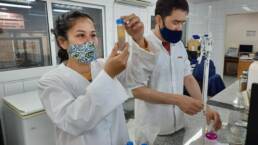Desde 2018, la Universidad de La Sabana impulsa una iniciativa para convertirse en una universidad de tercera generación (3GU).
De acuerdo con J.G Wissema, profesor emérito y consultor de Delft University of Technology (de Países Bajos), una universidad de tercera generación debe adoptar la innovación basada en la transferencia de resultados de investigación y el epíritu emprendedor como parte de sus objetivos estratégicos (Wissema, 2009). La adopción de este punto de vista para definir el rol de la Universidad, se ha convertido en una apuesta estratégica promovida por el liderazgo universitario, el cual ha dado lugar a varios proyectos internos enfocados en redefinir sus planes de desarrollo, desarrollando determinadas capacidades, con el fin de apoyar esta transformación. Uno de esos proyectos institucionales cuenta con el apoyo del proyecto I2LATAM.
Así, para convertirse en una universidad de tercera generación, la Dirección General de Investigación de la Universidad de La Sabana está llevando a cabo una serie de análisis y evaluaciones, en consulta con actores internos (investigadores, líderes y gestores de I+D+i) y externos, con el objetivo de proponer de dos a tres macro-proyectos que permitan alinear la capacidad de investigación de la Universidad hacia la resolución de problemas identificados a nivel local, nacional e internacional. Localmente, la apuesta de la Universidad es promover la colaboración con actores de la región de Sabana Centro, una iniciativa que comenzó en el 2012 para colaborar activamente con el área de influencia de la Universidad. Por lo tanto, se espera que un problema o una investigación orientada por misiones resulte en un aumento de las iniciativas de innovación y emprendimiento.
Como parte de este ejercicio, el proyecto Erasmus+ I2LATAM propone una metodología para analizar las capacidades institucionales de I+D+i basadas en: el número de investigadores por áreas de acción (masa crítica), apalancamiento de recursos externos, producción científica, líneas de investigación, entre otros indicadores. La Sabana usará estos datos con el fin de alinear las capacidades institucionales a los principales macropoyectos definidos por la Universidad, a través de los cuales se pueden abordar los problemas a nivel local, nacional e internacional.
En este sentido, I2LATAM apoyará la transformación de la Universidad, reforzando su papel dentro de un ecosistema local y centrándose en las necesidades y oportunidades regionales, al tiempo que mejora su estrategia de internacionalización.
Referencias:
Wissema, J. G. (2009). Towards the third-generation university: Managing the university in transition. Edward Elgar Publishing.
El proyecto Erasmus+ I2LATAM propone una metodología para analizar las capacidades institucionales de I+D+i basadas en: el número de investigadores por áreas de acción (masa crítica), apalancamiento de recursos externos, producción científica, líneas de investigación, entre otros indicadores.


